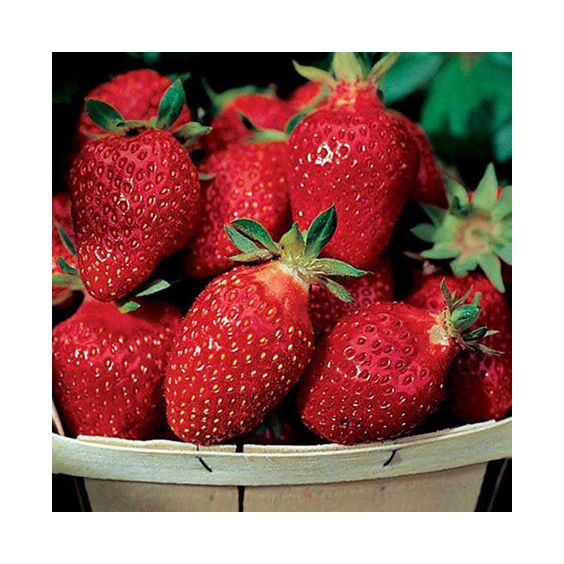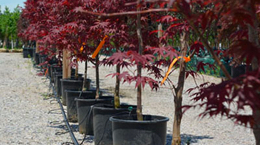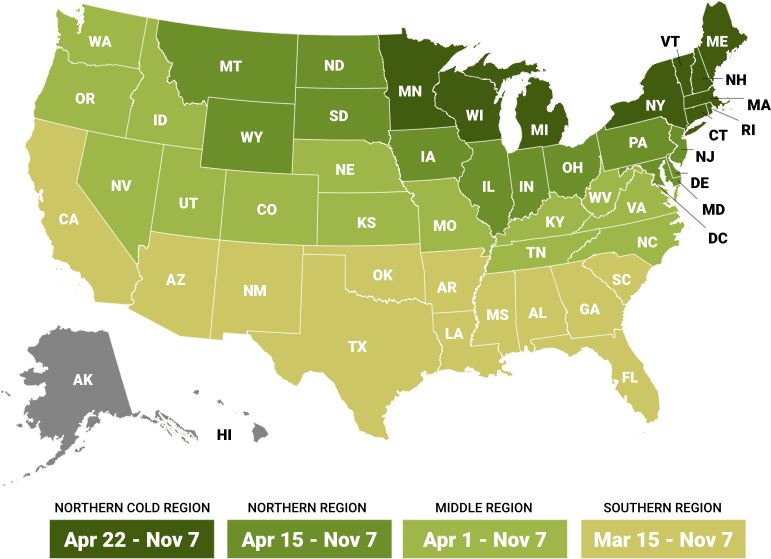
Growing zones
See Zone Map >Status: In stock
- Sun
Mature Plant Size (H x W): 6-12" x 12-18"
Bloom Season: Spring, Summer, Fall
- Attracts Bees
- Attracts Birds
- Edible to People
- Attracts Butterflies
- Attracts Pollinators
Planting & Care for Edible Plants – Strawberry Fruit
Preparation
- The Fort Laramie Strawberry produces large berries and are sweet with a good flavor and texture.
- Super-sturdy strain thrives in all parts of the country.
- This sweet strawberry is excellent for fresh use and for processing.
- It's a self-pollinating edible plant.
- The fruit color is a gorgeous bright, scarlet red color.
- Mature growth is around 3-6" tall.
- Make sure to space 12-15" apart when planting.
- Hardiness zone 3.
- These strawberries can be planted in containers!
- Everbearing Strawberries produce an early summer crop and also a fall crop with some berries on and off all summer. Tip: Pinch off blooms for first two months on everbearing strawberries to promote larger harvest.
- Strawberry plants need a soil pH level 5.3 - 6.5. Not sure what your soil level is? Run a test before planting.
- There are three different ways you can plant your strawberry patch; matted rows, hill rows or solid beds. Strawberries can also be grown in containers.
- Life of plants 3-4 years with proper maintenance.
Opening Plant Material
- Bare Root - Cut open the bundle (top and roots are tied) and separate all the plants. Soak roots in buckets of water until planted. Each plant type will be labeled separately for identification. Do not expose the roots to sun. They should never dry out. Keep roots covered. All bare-root plants must be trimmed when planted.
Planting Bare Root Bundles
- Strawberries come in bare root bundles.
- When you receive your plants separate the bundled plants, remove any dried leaves at their tops and soak the roots in water for an hour or two before planting.
- Plant them early in spring, while the ground is still cool and moist, and in a sunny spot, if possible.
- Fan out the roots, keeping them straight down. (If the roots are long, you can trim them back to about 4 to 5”, before planting.)
- Plant the crown even with the soil line. Avoid planting too deep or too shallow.
- Firm the soil around each plant and water well.
Pruning - Through-out the Season
- Don’t be intimidated when it comes to pruning. It’s important to do so to ensure the size and shape of your plant stays regulated, stimulate strong growth, and overall fruit quality.
- For everbearing varieties, start harvesting in mid-summer of the first year. Start a new bed the next spring. Continue to harvest all summer long on the original bed then destroy it. The finest and best yields are from young vigorous plants that are allowed to crop for a maximum of two seasons.
Watering - After Planting
- If summer brings about one to one and a half inches of rainfall every week or so, you won’t need to use the hose. But if it gets really dry, you can give your new plant a good, thorough soaking. The best way to do this is to let your garden hose trickle slowly. This gives the water a chance to soak in instead of running off. You can also use a soaker hose to water several plants at once.
Watering - Through-out the Season
- Water strawberries so that they receive a minimum of 1 inch of water per week during the growing seasons.
Planting & Handling Help
Download our Planting and Handling Guide below to plan for a successful arrival and install of your plants. Be sure to water all plants as soon as they arrive and every day until you’re ready to plant. Keep any bare root bundles in a shady, cool spot with the roots covered at all times.


Learn More
Watch our videos on handling bare root plants, how your order is prepared for shipment and more.


Plant Sizing
What is the difference between Containers, Grow Bags, Bare Root, and Balled & Burlap (B&B)?
Shipping Times


Our FedEx and local shipping times depend on two factors, one is by the region and the second is the type of product being shipped. For example, small fruits are only shipped in spring, but majority of our perennials are shipped from spring until fall. Keep in mind the dates below act as a general guide. Due to unpredictable weather, staffing, inventory and industry demands these timelines can change. Therefore, we cannot guarantee any of these times.
Shipping Dates by Region*
Northern Cold Region: April 22nd - November 7th
Northern Region: April 15th - November 7th
Middle Region: April 1st - November 7th
Southern Region: March 15th - November 7th
Local Delivery (small radius from Waterloo, WI): April 22nd - November 7th
Shipping Dates by Season*
Spring Shipping: Region Start Date (above) - May
Fall Shipping: September - November
Due to unpredictable weather, these times may vary. Some varieties are exceptions due to heat and plant health reasons. Enter your shipping zip code at the top of this page and be sure to check the shipping information on each product before you add it to your cart. If the product is too large or restricted in your state, you will not be able to checkout with that item in your cart.
